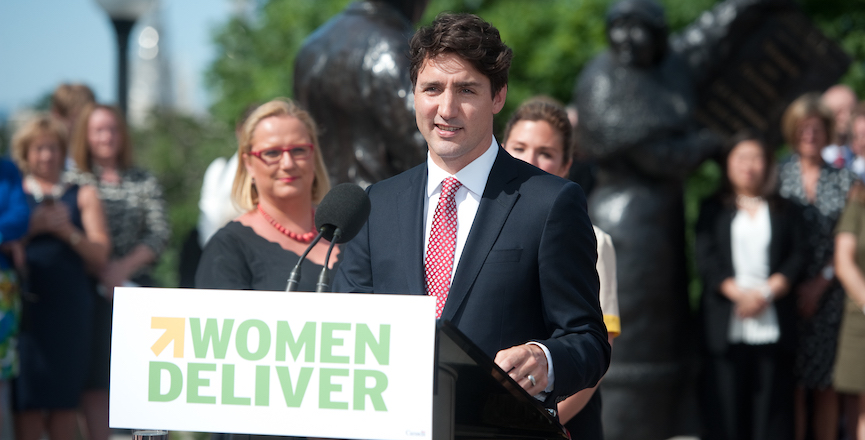Leading up to International Women’s Day today, I couldn’t help but wonder what publicity stunt our “feminist” prime minister was sure to pull this year. Amidst revelations of alleged political interference on the SNC-Lavalin file, and the bullying of former justice minister Jody Wilson-Raybould, our “feminist” prime minister’s true colours are beginning to show — and they aren’t the bright pink hues he has sported in the past.
Trudeau’s treatment of Jody Wilson-Raybould has revealed that under his leadership, women will thrive if only they remain quiet and compliant. Otherwise, they will be bullied by men in power, and left with a soiled reputation after being labelled “vocal,” “difficult,” and “hard to work with” (read: confident, determined, and persistent).
The Trudeau government’s reaction to Jody Wilson-Raybould’s testimony has exposed what many of us already knew: That Trudeau’s “feminism” merely champions feminist slogans that are void of any real substance or virtue. At the end of the day, his government is careful to dot their i’s and cross their t’s, but ultimately seeks to benefit politically from decades of women’s struggles rather than do the grunt work of bringing about lasting systemic change.
This duplicity is perhaps most visible in Trudeau’s flagship “feminist foreign and international assistance policy.” While Trudeau would have Canadians believe that “Canada is back” — at the forefront of humanitarian assistance and peacekeeping on the international stage — the truth is much more nuanced.
Indeed, if you take a careful look at the Trudeau government’s budget, you’ll notice that our foreign assistance spending is slightly under 0.3 per cent of the Gross National Income (GNI). This figure falls short of the average spent by Canada’s peers in the Organization for Economic Co-operation and Development (OECD), and is a far cry from the UN target of 0.7 per cent for foreign aid. When you compare Trudeau’s international assistance spending to the defence budget, the situation is even more worrisome. Currently defence spending supersedes foreign assistance, sitting roughly around 1.4 per cent.
While this figure might seem harmless to some, to feminists it is startling since most — if not all — feminists strongly oppose the proliferation of arms and investments in the military industry. Generally, feminists have taken on the anti-war cause because they recognize the link between war and arms proliferation and gender-based violence. This link is evidenced in the situation unfolding in Yemen today, where the Saudi coalition’s reckless attacks and blockades have killed over 13,000 Yemeni civilians and have led to the starvation of the country. Currently an estimated 24 million people — 80 per cent of the population — is in dire need of assistance and protection, with Yemeni women and girls paying the highest price in this war. Indeed, 76 per cent of internally displaced persons (IDPs) in Yemen are women and girls.
At the end of February, Foreign Affairs Minister Chrystia Freeland and then International Development Minister Marie-Claude Bibeau produced a seemingly feminist announcement, pledging $47 million in aid to Yemen, stating that “Canada’s support in Yemen is driven by our desire to end a terrible situation that has caused the suffering of so many people — especially women and children who bear the brunt of the crisis.” While on the surface this funding seems to work toward the good of Yemeni women and children, it by nature is hypocritical, since Canada is the one providing Saudi Arabia with $15 billion-dollars’ worth of arms in the first place.
This is problematic from a feminist standpoint for a number of reasons, not the least of which that our government is giving economic rewards to Saudi Arabia — one of the most notorious women’s rights abusers in the world.
While Trudeau’s policies abroad clearly call into question his “feminism,” here at home the picture isn’t much brighter — especially when policies concern Indigenous women and girls. While Trudeau can be commended for finally launching the National Inquiry into Missing and Murdered Indigenous Women and Girls (MMIWG), there are many criticisms of the scope and purview of the Inquiry. For example, the Inquiry fails to engage with justice partners, nor allow for legal recourse for survivors and families of MMIWG.
Many families of MMIWG have complained that the Inquiry is a needless effort to formally recognize the facts-on-the-ground, arguing that what is really urgent is a legally-binding National Action Plan on MMIWG. If our “feminist” Prime Minister truly wanted to promote systemic change, there are immediate actions the government could take to address discrimination against Indigenous women and girls; for example, amending the status provisions to remedy sex discrimination in the Indian Act, addressing allegations of forced sterilizations, and moving quickly to hand over child welfare services to Indigenous governments, among other things.
When the rubber hits the road, if we want to evaluate Canada’s priorities, one needs only to ask the question, “where are we putting our big bucks?” In this respect, it is obvious that Trudeau’s priority is commercial interests over human rights.
While Trudeau has undoubtedly used positive political rhetoric to promote diversity, Indigenous rights, and women’s rights, his policies are incoherent. You can’t be a feminist in talk but refuse to walk the walk. It’s time for our prime minister to make feminism a reality in Canada — and not just some pretty slogan on a billboard.
Miranda Gallo is a Research Analyst and Campaigns Coordinator with Canadians for Justice and Peace in the Middle East (CJPME). Miranda holds a BA in World Islamic and Middle East Studies, and is currently undertaking graduate studies in Indigenous Policy and Administration at Carleton University. Most of her work is focused on advocating for human rights as they relate to Canada and the Middle East, as well as the rights of indigenous peoples around the world.
Image: Women Deliver/Flickr
Help make rabble sustainable. Please consider supporting our work with a monthly donation. Support rabble.ca today for as little as $1 per month!




